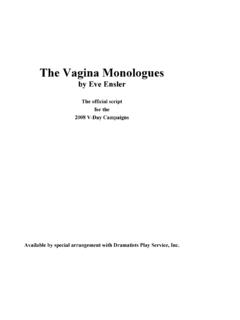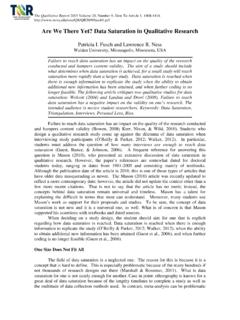Transcription of Marriage in Seventeenth-Century England: The Woman’s Story
1 Marriage in Seventeenth-Century England: The Woman's Story Alice Brabcov . University of West Bohemia, Plze . The seventeenth century represents a fascinating period of English history, drawing the attention of whole generations of historians. This turbulent age saw three major events that had a deep impact on England' s political as well as social life the English Revolution, the Restoration of the Stuarts in 1660 and the Glorious Revolution in 1688. Amidst the turmoil of the events, people's everyday lives unfolded. While it was men's preoccupation to keep the country's political and economic affairs going, women had an indispensable, though far less public, part to play.
2 This paper aims at providing an outline of the Seventeenth-Century English Marriage , viewed from the woman's perspective. It touches upon topics such as concluding marriages, basic Marriage values, duties of a married woman and possibilities of divorce. Attention is paid to the areas in which the Seventeenth-Century reality was different from today's. In Seventeenth-Century England, Marriage and sexual morals played a far more important social role than nowadays. A family centred around a married couple represented the basic social, economic and political unit.
3 In the Stuart period, a husband's rule over his wife, children and servants was seen as an analogy to the king's reign over his people a manifestation of a hierarchy constituted by God. A woman was regarded as the weaker vessel' (a phrase taken from the New Testament) a creature physically, intellectually, morally and even spiritually inferior to a man; therefore, the man had a right to dominate her (Fraser 1981: 1). In a society strongly influenced by Puritan values, sexual integrity and the status of a married person gave a woman respectability and social prestige.
4 This, together with the fact that it was very difficult for women to find ways of making an independent living, meant that securing a husband was a matter of great importance. Theoretically, it was possible for two people to marry very young. The minimum legal age was 12 years for women and 14 years for men. In addition, it was possible for the couple to get engaged at the age of 7, with the right to break off the engagement on reaching the minimum age of consent (Stone 1965: 652). However, early marriages were rather rare the average age of the newlyweds was about 25 years.
5 Interestingly, the basic requirement for a legally valid Marriage was not a formal consecration in a church, but the completion of a Marriage contract, commonly called spousals'. Spousals were an act in which the bride and groom said their vows in the present tense per verba de prasenti' (Ingram 1987: 126). In a majority of cases, this procedure was accompanied by a church ceremony (banns). Yet if the Marriage was concluded without witnesses and not consecrated in a church, it had the same legal validity. This practice had existed in England since the twelfth century and lasted till 1753.
6 Not having to go through a church ceremony made it possible for lovers to marry secretly, without the knowledge of their parents. In this way, they could escape the dynastic scheming of their families. Alice Brabcov . Given its social significance, Marriage was considered a matter of a larger community, not only the couple themselves. Although the number of purely arranged marriages was decreasing as opposed to the previous centuries, young women were expected to consult their choice of a partner with their parents and relatives, especially with those that intended to bestow some property on them.
7 Generally speaking, the poorer a girl was, the greater freedom she had in choosing her future husband. But even the children of the poor were expected to ask their parents for their blessing, though money had a small part to play here. There were several criteria which decided whether a match was appropriate'. Contemporary moralists recommend that the couple should be of similar age, background, financial circumstances and religious beliefs. Concord in manners and interests was beneficial as well. The husband and wife should like and respect each other even love each other but they should beware of mere sexual fascination and look for inner qualities.
8 The widespread opinion was that love came after the wedding. An example of such a Marriage was the relationship of the Puritan leader Oliver Cromwell with his wife Elizabeth. Though the two people married out of prudence, not love, in the course of time they developed a deep and enduring bond; thus, in one of her letters, Elizabeth writes to her husband, Truly my life is but half a life in your absence' (Carlyle 1888: 247). The key quality in a woman was an ability to run the household efficiently. This was frequently the chief consideration for a man in his choice of a wife, especially in poorer families.
9 A helpmate' was a term that the Puritans liked to use when referring to a good wife. Does this mean, however, that romantic love played no part in Marriage ? Judging by the large number of Seventeenth-Century diaries, autobiographies or accidental notes in legal documents, romantic love did play an important role on all social levels. Church court records speak of numerous marriages concluded secretly, without parental knowledge. The above- mentioned sources also contain rich vocabulary describing the feelings and behaviour of young couples words such as love', fantasy', attraction', flirtation', etc.
10 For the famous diarist Samuel Pepys, physical attraction was the sole reason for concluding a Marriage . Elizabeth, his young wife, came from a poor family of Catholic immigrants, so this match could hardly be called prudent. Yet Elizabeth's comeliness was a constant source of joy to Pepys. Many years after the wedding, upon the occasion of visiting a theatre, he recalls, But which did please me beyond anything in the whole world was the wind- music [ ] which is so sweet that it ravished me, and indeed in a word, did wrap up my sould so that it made me really sick (just as I have formerly been when in love with my wife.)


